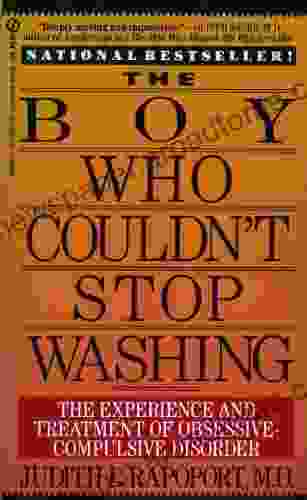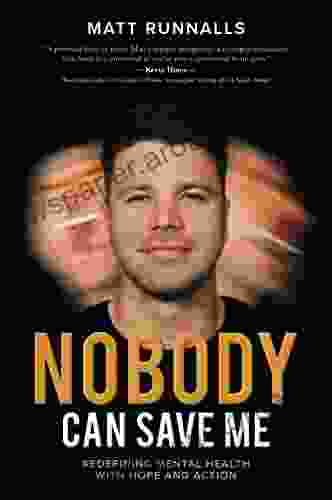Reclaim Your Life from OCD: The Essential Guide to Treatment and Recovery

Obsessive-compulsive disFree Download (OCD) is a common mental health condition that affects millions of people worldwide. OCD is characterized by intrusive thoughts, images, or urges that cause anxiety or distress. These thoughts or urges can lead to repetitive behaviors, such as excessive hand washing, checking, or counting.
4.5 out of 5
| Language | : | English |
| File size | : | 831 KB |
| Text-to-Speech | : | Enabled |
| Screen Reader | : | Supported |
| Enhanced typesetting | : | Enabled |
| Word Wise | : | Enabled |
| Print length | : | 308 pages |
OCD can be a debilitating condition that can interfere with work, school, relationships, and daily activities. However, there is hope. With the right treatment, you can manage your OCD symptoms and live a full and happy life.
What is OCD?
OCD is a mental health condition that is characterized by intrusive thoughts, images, or urges that cause anxiety or distress. These thoughts or urges can lead to repetitive behaviors, such as excessive hand washing, checking, or counting.
OCD is often divided into two categories:
- Obsessions are intrusive thoughts, images, or urges that cause anxiety or distress. These thoughts or urges can be about anything, but they are often related to themes of contamination, harm, or perfectionism.
- Compulsions are repetitive behaviors that people with OCD perform in Free Download to reduce the anxiety or distress caused by their obsessions. These behaviors can include things like excessive hand washing, checking, or counting.
What causes OCD?
The exact cause of OCD is unknown, but it is thought to be caused by a combination of genetic and environmental factors. Some of the factors that may contribute to the development of OCD include:
- Genetics: OCD is thought to be a heritable condition, meaning that it can be passed down from parents to children. However, it is important to note that not everyone who has a family history of OCD will develop the condition.
- Brain chemistry: People with OCD have been found to have differences in the levels of certain neurotransmitters in their brains. These neurotransmitters are involved in mood regulation and anxiety.
- Environmental factors: Certain environmental factors, such as childhood trauma or abuse, may also contribute to the development of OCD.
What are the symptoms of OCD?
The symptoms of OCD can vary from person to person. Some of the most common symptoms include:
- Intrusive thoughts, images, or urges that cause anxiety or distress
- Repetitive behaviors, such as excessive hand washing, checking, or counting
- Excessive worry or fear
- Perfectionism
- Difficulty concentrating
- Avoidance of certain situations or objects
How is OCD diagnosed?
OCD is diagnosed by a mental health professional, such as a psychiatrist or psychologist. The diagnosis is based on a clinical assessment, which includes a review of the person's symptoms and a physical examination. The mental health professional will also ask about the person's family history and any other medical conditions that they may have.
How is OCD treated?
There are a number of effective treatments for OCD, including:
- Cognitive-behavioral therapy (CBT): CBT is a type of talk therapy that helps people with OCD to identify and change the negative thoughts and behaviors that contribute to their symptoms. CBT has been shown to be effective in reducing OCD symptoms and improving quality of life.
- Medication: Antidepressants, such as selective serotonin reuptake inhibitors (SSRIs),can be effective in reducing OCD symptoms. Medication may be used alone or in combination with CBT.
- Exposure and response prevention (ERP): ERP is a type of behavioral therapy that helps people with OCD to gradually face their fears and resist their compulsions. ERP has been shown to be effective in reducing OCD symptoms and improving quality of life.
What is the prognosis for OCD?
The prognosis for OCD is generally good. With the right treatment, most people with OCD can manage their symptoms and live full and happy lives. However, OCD is a chronic condition, and some people may experience symptoms throughout their lives. It is important for people with OCD to stay in regular contact with their mental health professional and to follow their treatment plan.
Where can I get help for OCD?
If you think you may have OCD, it is important to seek professional help. There are a number of resources available to help you find mental health treatment, including:
- The National Institute of Mental Health (NIMH)
- The International Obsessive-Compulsive DisFree Download Foundation (IOCDF)
- The Anxiety and Depression Association of America (ADAA)
OCD is a common mental health condition that can interfere with work, school, relationships, and daily activities. However, there is hope. With the right treatment, you can manage your OCD symptoms and live a full and happy life.
If you think you may have OCD, it is important to seek professional help. There are a number of resources available to help you find mental health treatment. With the right treatment, you can reclaim your life from OCD.
4.5 out of 5
| Language | : | English |
| File size | : | 831 KB |
| Text-to-Speech | : | Enabled |
| Screen Reader | : | Supported |
| Enhanced typesetting | : | Enabled |
| Word Wise | : | Enabled |
| Print length | : | 308 pages |
Do you want to contribute by writing guest posts on this blog?
Please contact us and send us a resume of previous articles that you have written.
 Book
Book Novel
Novel Page
Page Chapter
Chapter Text
Text Story
Story Genre
Genre Reader
Reader Library
Library Paperback
Paperback E-book
E-book Magazine
Magazine Newspaper
Newspaper Paragraph
Paragraph Sentence
Sentence Bookmark
Bookmark Shelf
Shelf Glossary
Glossary Bibliography
Bibliography Foreword
Foreword Preface
Preface Synopsis
Synopsis Annotation
Annotation Footnote
Footnote Manuscript
Manuscript Scroll
Scroll Codex
Codex Tome
Tome Bestseller
Bestseller Classics
Classics Library card
Library card Narrative
Narrative Biography
Biography Autobiography
Autobiography Memoir
Memoir Reference
Reference Encyclopedia
Encyclopedia Junbo Jia
Junbo Jia Mamta Motiyani
Mamta Motiyani Matt Whyman
Matt Whyman Stanley Booth
Stanley Booth Julia Hobsbawm
Julia Hobsbawm Sixth Edition Kindle Edition
Sixth Edition Kindle Edition Rasha Waheeb
Rasha Waheeb Joseph Dulmage
Joseph Dulmage Mark Tedeschi
Mark Tedeschi Mike Mutzel
Mike Mutzel Justin P Mcbrayer
Justin P Mcbrayer Sir Alan Lascelles
Sir Alan Lascelles Scott Walker
Scott Walker K L Hammond
K L Hammond Stuart Tootal
Stuart Tootal Klaus Hurrelmann
Klaus Hurrelmann Josh Peck
Josh Peck Nicole Shilo
Nicole Shilo Wayne Grudem
Wayne Grudem John N Gardner
John N Gardner
Light bulbAdvertise smarter! Our strategic ad space ensures maximum exposure. Reserve your spot today!

 W. Somerset MaughamUnveiling the Monster of All Time: A Literary Journey into the Depths of...
W. Somerset MaughamUnveiling the Monster of All Time: A Literary Journey into the Depths of...
 Ezekiel CoxUnlock the Healing Power of Nature: Discover "And Other Inspiring Stories Of...
Ezekiel CoxUnlock the Healing Power of Nature: Discover "And Other Inspiring Stories Of...
 Carl WalkerStep into the Timeless Beauty of Black and White Photography: Introducing the...
Carl WalkerStep into the Timeless Beauty of Black and White Photography: Introducing the... Yasunari KawabataFollow ·3.3k
Yasunari KawabataFollow ·3.3k Albert ReedFollow ·5.9k
Albert ReedFollow ·5.9k Jason HayesFollow ·16k
Jason HayesFollow ·16k Devin CoxFollow ·9.7k
Devin CoxFollow ·9.7k Colin FosterFollow ·14.4k
Colin FosterFollow ·14.4k Paul ReedFollow ·10.6k
Paul ReedFollow ·10.6k Oscar BellFollow ·12.6k
Oscar BellFollow ·12.6k Brian WestFollow ·7.7k
Brian WestFollow ·7.7k

 Sidney Cox
Sidney CoxSpiritualism in the American Civil War
An Unseen Force in the...

 Robbie Carter
Robbie CarterEmpowering Healthcare Professionals: Discover the...
Welcome to the world of...

 Virginia Woolf
Virginia WoolfUnveil the Secrets of Nature's Healing Scents: "Growing...
Embark on an aromatic journey...

 Martin Cox
Martin CoxThe Fat Girl's Guide to Loving Your Body: Empowering...
Alt attribute: Confident plus-size woman...

 Graham Blair
Graham BlairUnlock the Secrets of Vegetables: Their Nutritional Power...
In the realm of culinary delights and...

 H.G. Wells
H.G. WellsStep-by-Step Guide to Crafting Astonishing Kumihimo...
Are you ready to embark on a captivating...
4.5 out of 5
| Language | : | English |
| File size | : | 831 KB |
| Text-to-Speech | : | Enabled |
| Screen Reader | : | Supported |
| Enhanced typesetting | : | Enabled |
| Word Wise | : | Enabled |
| Print length | : | 308 pages |






